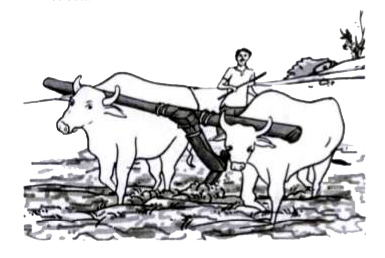Why is it necessary to level the soil after ploughing?
Step-by-Step Solution:
1. Understanding Soil Leveling: After ploughing, the soil is often uneven due to the turning and breaking up of the soil. Leveling the soil helps create a uniform surface.
2. Improving Soil Quality: Leveling does not directly change the soil's inherent quality but can enhance its overall condition. A level surface allows for better air circulation and water distribution.
3. Reducing Soil Erosion: An even surface minimizes the risk of soil erosion. When the soil is level, water can flow evenly across the surface, reducing the chances of runoff that can wash away topsoil.
4. Protecting Seeds: Leveling helps ensure that seeds sown in the soil are adequately covered. This prevents them from being exposed to elements like wind and water, which could displace them or wash them away.
5. Facilitating Water Management: A leveled field allows for better irrigation practices. Water can be distributed evenly across the field, ensuring that all plants receive adequate moisture.
6. Enhancing Crop Growth: With better water management, reduced erosion, and protected seeds, leveling ultimately contributes to healthier crop growth and higher yields.
Topper's Solved these Questions
- CROP PRODUCTION AND MANAGEMENT BOOK - MTG IIT JEE FOUNDATIONCHAPTER - CROP PRODUCTION AND MANAGEMENT EXERCISE - SOLVED EXAMPLES
10 Videos
- CROP PRODUCTION AND MANAGEMENT BOOK - MTG IIT JEE FOUNDATIONCHAPTER - CROP PRODUCTION AND MANAGEMENT EXERCISE - NCERT SECTION
18 Videos
- CONSERVATION OF PLANTS AND ANIMALS BOOK - MTG IIT JEE FOUNDATIONCHAPTER - CONSERVATION OF PLANTS AND ANIMALS EXERCISE - OLYMPIAD/ HOTS CORNER
12 Videos
- FOOTSTEPS TOWARDS CBSE BOARDBOOK - MTG IIT JEE FOUNDATIONCHAPTER - FOOTSTEPS TOWARDS CBSE BOARDEXERCISE - SECTION D
5 Videos
Similar Questions
Knowledge Check
Modern agriculture is carried out in a scientific and systematic way. The various activities or tasks which a farmer performs to produce a good crop are known as agricultural practices. A number of tools that are required during the course of different agricultural practices are called implements. The given picture shows one of the process involved in the preparation of soil.

Why is it necessary to level the soil after the given process?ATo maintain pH of soilBTo remove weeds from soilCTo increase irrigation timeDTo prevent soil erosion by wind or water
Why is it necessary to classify animals?
View SolutionWhy is it necessary to analyse the collected data?
View SolutionWhy is it necessary to prepare Trial Balance ?
View SolutionWhy is it necessary to ban the use of plastic bags?
View SolutionWhy is it necessary to ban the use of plastic bags?
View SolutionWhy is modulation necessary at all ?
View SolutionWhy earthing is necessary ?
View Solution
